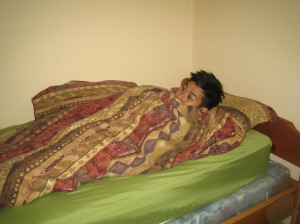Insomnia is a sleep disturbance that affects children where they have trouble falling asleep and staying asleep during the night. Insomnia can be classified based on duration such as short or long-term as well as the frequency and severity of the problem. Short term insomnia happens for just a few days up to weeks and can be caused by factors such as sickness and short-term medications. Long-term insomnia happens three times in a week or for months or longer and can be caused by pain, anxiety and medical problems. Oftentimes, sleeplessness is caused by stress and depression of everyday life among adults, but children can also suffer from insomnia.
Symptoms
- Irritability and mood swings
- Sleepy during the day
- School and disciplinary problems
- Difficulty falling asleep or staying asleep
Oftentimes, sleeplessness is caused by stress and depression of everyday life among adults, but children can also suffer from insomnia. - Depression
- Tension when going to bed and being able to go to sleep
- Hyperactivity
- Shortened span of attention
- Problems with memory
- Making errors or prone to accidents
- Aggression
Causes
- Stress
- Using caffeine and other stimulants such as drinking soda. Some energy drinks that contain caffeine, nicotine and alcohol can also cause sleeplessness.
- Side effects of medications for hyperactivity disorder, corticosteroids, antidepressants and anticonvulsant can cause insomnia.
- Suffering from night-time asthma, stuffy nose caused by allergies and itchiness of the skin due to eczema can also cause insomnia.
- Environmental factors such as heat, cold, noise and lighting conditions inside the bedroom can interfere with sleep.
Treatment
- Maintain good sleeping habits such as minimizing time spent in bed by just sleeping. Avoid reading, doing homework or watching TV while in bed. Maintain a regular sleeping schedule by going to bed and waking up at the same time every day including weekends and holidays.
- Take a warm bath or a massage can help the affected child fall asleep.
- Avoid consuming caffeinated drinks 4-6 hours before bedtime such as coffee, tea, colas, energy drinks and chocolates.
- Avoid stimulating activities within an hour before going to bed such as watching television, doing heavy homework, playing computer games and electronic gaming.
- Teach children how to relax such as performing deep breathing, positive mental imagery while lying in bed and other relaxation techniques such as performing quiet abdominal breathing to promote sleep. Another way is create a relaxing environment before bedtime such as reading and listening to soft music.
- Maintain a bedroom that is comfortable, quiet, calm and dark. Install a nightlight if the child is afraid of a bedroom that is dark. Avoid discussion or arguments that can cause anxiety in order to avoid difficulty in sleeping.
- Set a bedtime for the child such as 9-11 hours of sleep every night depending on the age of the child. Children between the ages 6-12 requires 10-11 hours of sleep every day while teenagers need 9 hours of sleep every day.

